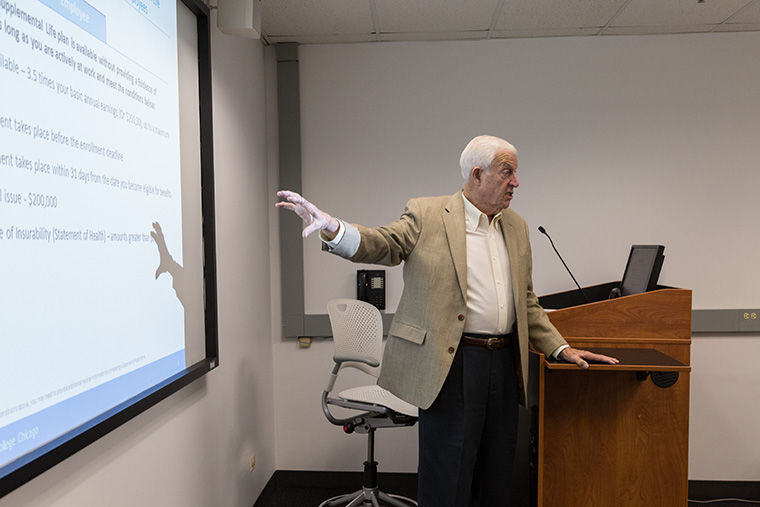Insurance benefits slashed for non-union employees
Informational sessions were held the week of Sept. 19 for employees with questions regarding life insurance benefits, announced in a Sept. 12 email.
September 26, 2016
Full-time, non-union employees were notified of benefits cuts, effective Oct. 1, reducing the payment to beneficiaries in the event of an employee’s death, according to a Sept. 12 email from Columbia’s Human Resources Department.
The email—sent to employees without prior notice—informed employees Columbia will now pay 1.5x their annual income to their beneficiaries as compared to the 3.5x it previously paid for.
According to a statement from college spokeswoman Cara Birch, the cuts were caused by rising costs of employee benefits along with low enrollment. In 2008, Columbia spent an average of $20,000 for each employee, and the cost increased to $30,000 in 2016. Birch said the cuts are expected to save Columbia approximately $270,000 in 2017.
“The decision was not taken without deep consideration to the impact to our employees,” Birch said in the statement. “We believed reducing the benefit was the option that would have the least impact, while providing savings for 2017.”
Katharine Hamerton, associate professor in the Humanities, History, & Social Sciences Department, said this was the first time she experienced benefits changes made without prior notice. She said she was surprised and disappointed to hear about the cuts.
Employees will also be provided with options to purchase supplemental coverage in addition to the basic coverage. Added services include grief counseling for beneficiaries, last will and testament preparation, and real estate preparation services, according to the email.
Hamerton said the added services do not make up for the cuts.
“I don’t think all the grief counseling in the world is going to replace the loss of peace of mind that comes with life insurance,” Hamerton said.
She added that insurance benefits have been good up to this point and valuable to employees.
Linda Williams, payroll manager, says she sees the cuts as beneficial to the college, and that the new benefits packages are still competitive with other schools.
“I talk to a lot of my friends and… their benefits are not quite as good as ours,” Williams said.
An email sent by Birch provided a comparison between Columbia’s life insurance benefits and other Chicago-area schools. Columbia will be joining DePaul and Loyola University offering 1.5x annual salary with a maximum of up to $500,000. Roosevelt University offers 1x annual salary up to a maximum of $150,000.
According to Gregory Foster-Rice, associate professor in the Photography Department and Faculty Senate president, the email left many employees with questions, leading the Faculty Senate’s executive committee to request a meeting with administrators to address concerns.
Foster-Rice said most employees had concerns about the impact of these changes and whether more cuts were planned for the future.
After a meeting held Sept. 19 with Faculty Senate members and several top administrators, a second email was sent Sept. 21 addressing employee concerns and extending information sessions’ dates.
“We received commitments from the administration that the benefits package and any further adjustments are going to be a point of discussion, rather than something that gets implemented without the faculty being aware with adequate time to make adjustments,” Foster-Rice said.
Hamerton said future cuts are also a concern for her.
“This particular benefit has been a promised component of our compensation package for many years and [it] looks like now the administration has decided to break that promise,” Hamerton said. “If the administration is now going to break promises like this, what is up for grabs next?”








